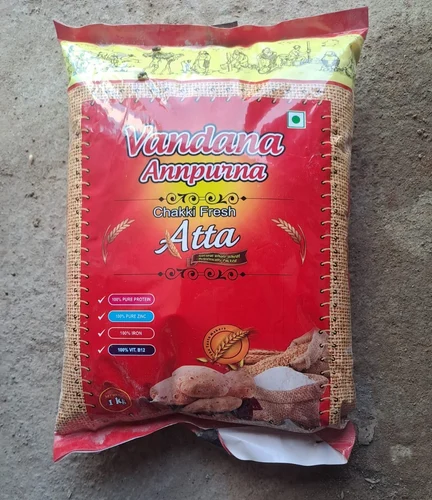1kg Vandana Annpurna Fresh Chakki Atta
₹34.0
| Packaging Size | 1 kg |
| Brand | Vandana Annpurna |
| Packaging Type | Bag |
| Usage/Application | Cooking |
| Best Before | 3 Month |
| Type | Chapati Flour |
| Speciality | High in Protein |
| FSSAI No. | 10422040000162 |
- Description
- Additional information
- Reviews (0)
- Q & A
- Sustainability Remark
- More Offers
- Store Policies
- Inquiries
- 100% PURE PROTEIN
- 100% PURE ZINC
- 100% IRON
- Natural Whole Wheat Hygienically Packed
- 100% Vit b12
- The taste makers
| brands | Vandana Annapurna |
|---|
You must be logged in to post a review.
Q & A
Organic products are generally considered more sustainable compared to conventional products. Here are some reasons why:
Reduced chemical use: Organic farming practices prohibit the use of synthetic pesticides, herbicides, and fertilizers. Instead, organic farmers rely on natural methods like crop rotation, composting, and biological pest control. This reduces chemical pollution in soil, water, and air, benefiting both the environment and human health.
Soil health: Organic farming focuses on building and maintaining healthy soil through practices such as composting, cover cropping, and avoiding synthetic chemicals. By promoting soil fertility and biodiversity, organic agriculture helps prevent soil erosion and degradation, enhances water retention, and supports long-term agricultural sustainability.
Preservation of biodiversity: Organic farming methods prioritize biodiversity conservation. They promote the use of diverse crop rotations, companion planting, and the preservation of natural habitats on farms. These practices support a variety of plant and animal species, including beneficial insects and pollinators, contributing to overall ecosystem health.
Reduced energy consumption: Organic farming often utilizes energy-efficient practices such as manual weed control, natural pest management, and locally sourced inputs. By minimizing the use of fossil fuel-based machinery and synthetic inputs, organic agriculture reduces energy consumption and associated greenhouse gas emissions.
Animal welfare: Organic livestock farming places a strong emphasis on animal welfare. Organic standards require animals to have access to outdoor areas, sufficient space, and organic feed. Prohibiting the routine use of antibiotics and growth hormones also contributes to the well-being of farm animals.
However, it's important to note that organic production is not without its challenges and critics. Organic farming generally requires more land and labor compared to conventional methods, which can limit scalability and increase costs. Additionally, transportation of organic products over long distances may offset some of their sustainability benefits.
To make informed choices about sustainability, it's also essential to consider other factors beyond organic certification, such as local and seasonal availability, packaging materials, fair trade practices, and overall supply chain transparency.
General Inquiries
There are no inquiries yet.



Reviews
There are no reviews yet.